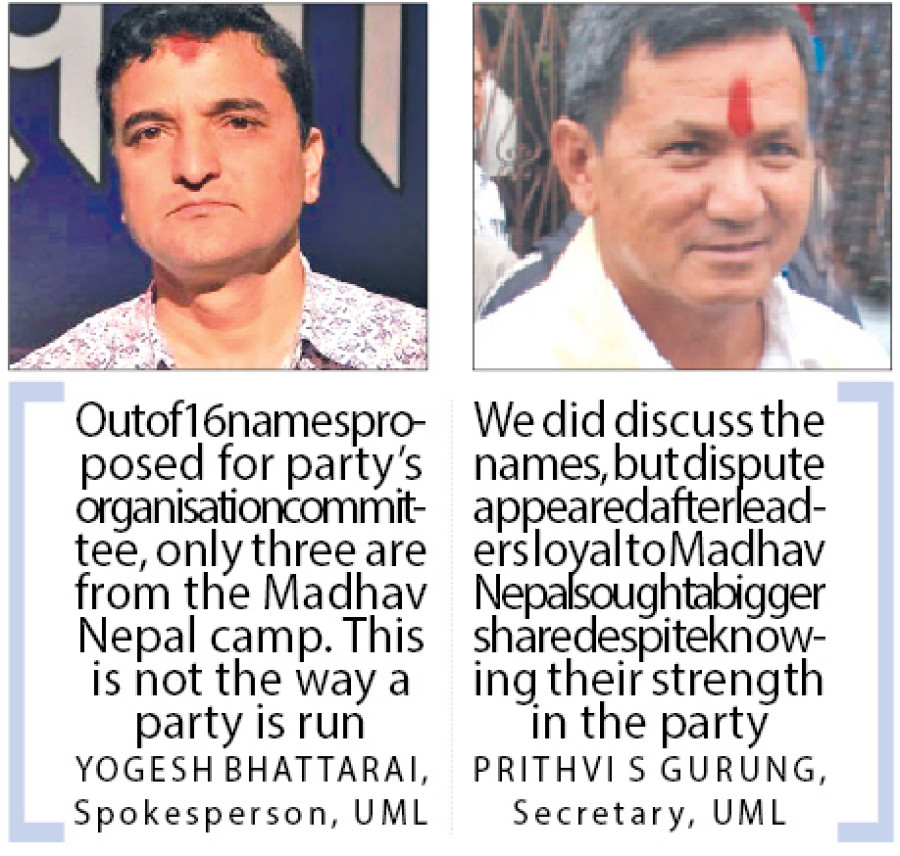Miscellaneous
Nepal faction ups ante against ‘Oli-garchy’
Says chairman’s ‘unilateral moves’ to sideline ‘rivals’ do no good to party
Bhadra Sharma
Factional feud has raised its ugly head in the ruling CPN-UML with senior leader Madhav Kumar Nepal upping the ante against what he calls party Chairman KP Sharma Oli’s “unilateral moves” to sideline “rival leaders”.
Oli is trying to give full shape to party’s departments based on a proposal presented last week by UML General Secretary Ishwor Pokharel. In the proposal for giving full shape to crucial organisation departments of the party, Pokharel has suggested incorporating majority of central leaders loyal to Oli.
Pokharel’s proposal came almost two years after Oli became the party chairman by defeating Nepal during the party’s general convention in July 2014. “The names [for organisation department] were presented unilaterally. We object to it. Such a move does no good to party,” said UML Spokesman Yogesh Bhattarai, who is close to leader Nepal.
The Madhav Nepal faction has accused Pokharel of presenting the names unilaterally contravening past traditions of discussing names at the party’s Secretariat first.
“Out of 16 names proposed for party’s organisation committee, only three are from the Madhav Nepal camp. This is not the way a party is run,” said Bhattarai, who is also secretary of the party.
Another UML Secretary Prithvi Subba Gurung, who is also close to Chairman Oli, however, said the names were presented in the Standing Committee after holding discussions in the Secretariat. “We did discuss the names of the leaders for the organisation committee, but the dispute appeared after they [leaders loyal to Nepal] sought a bigger share despite knowing their strength in the party,” said Gurung.
Party leaders say differences over naming leaders as members in 31 central departments has affected the party’s internal structures.
In view of giving complete shape to the departments, party’s Secretariat on Wednesday proposed members for 18 departments. Bid to appoint members, however, hit a snag after leaders loyal to Madhav Nepal objected to the proposal, saying their strength was not taken into consideration.
Shortly after the Secretariat presented the name list of the leaders for the organisation department, leader Nepal and his supporters objected to the proposal, alleging that there were names of only those leaders who are close to Chairman Oli. Leaders involved in finalising the list say only three members were picked from the Madhav Nepal faction in the 25-member organisation committee which is headed by the party’s general secretary. Pashupati Chaulagain, Shreemaya Thakali and Kalyani Khadka were named from the Madhav Nepal faction as members in the organisation department. The Madhav Nepal faction had proposed Surendra Pandey, Prakash Jwala, Beduram Bhusal, Shatrughan Mahato and Garima Shah among others as members in the organisation department.
When the Nepal faction demanded that few more members from its side be included, Oli is learnt to have rejected the call.
The delay in appointment of members in the departments has left hundreds of party cadres, who are eligible to get party responsibility, jobless. Irked at the establishment faction’s move, the Nepal faction has decided to boycott the party meeting indefinitely and its leaders are currently focusing on strengthening its reach at the local level. Leaders loyal to the Nepal faction say they had “excused Oli’s wrongdoings” in the wake of Madhes protests, Indian blockade and continuous attack on the government. But now we want to raise our voice, said the leaders, who have also become critical of the Oli-led government of late for “failing to deliver basic services”.
Oli has been criticised within the party for ignoring institutional decisions at crucial times—while appointing party leaders as ministers, naming leaders as parliamentary party office bears and while making political appointments.
“As far as protecting national interests and defending the new constitution are concerned, the government position is alright. But the government has largely failed when it comes to addressing the basic needs of the people, curbing black-marketeering and controlling corruption,” said Spokesperson Bhattarai.




 14.12°C Kathmandu
14.12°C Kathmandu










